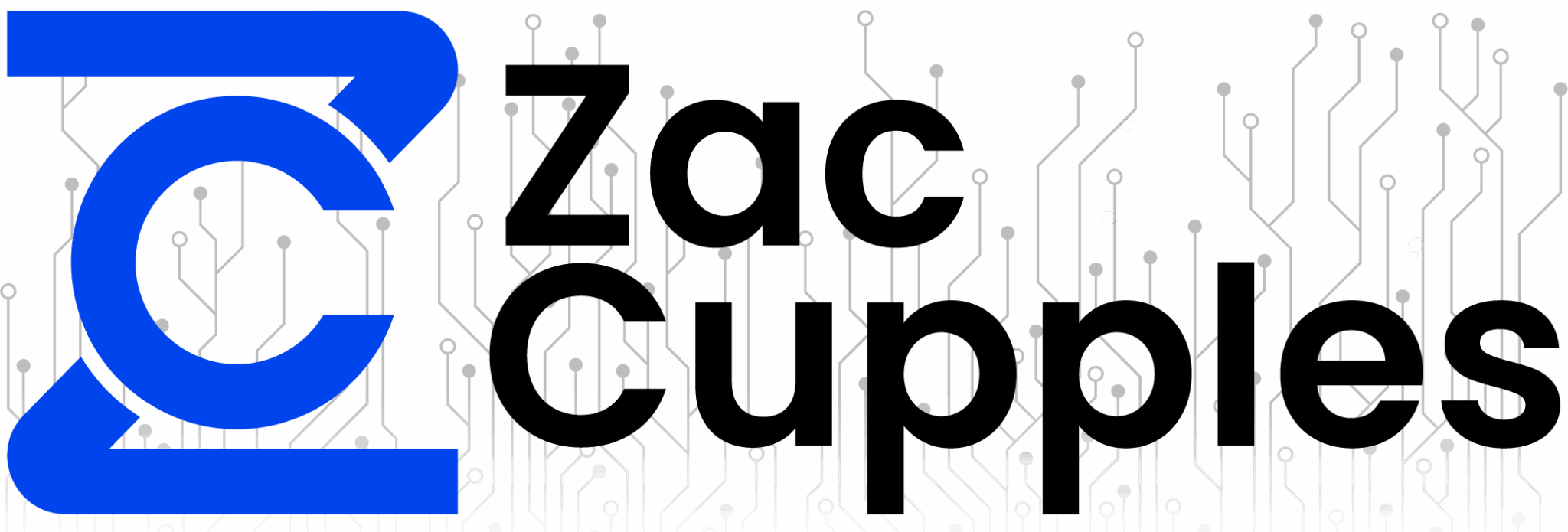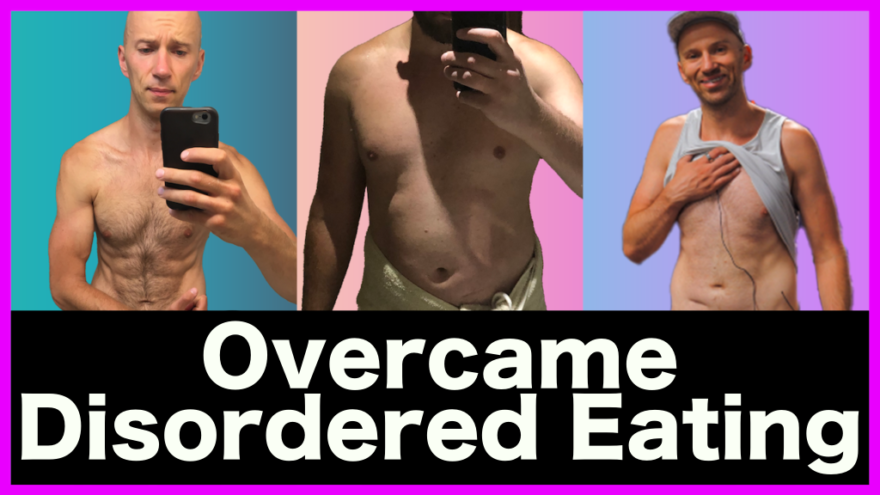Table of Contents
The 3 keys that helped me repair my relationship with food
Eating disorders affect roughly 30 million Americans, and I was one of them.
Left unchecked, the health consequences can be drastic, even to the point of death.
Fortunately, I was able to overcome the worst of the symptoms I experienced with 3 major keys.
Check out the video and blog below to see what worked for me.
Perhaps if you or someone else struggles with disordered eating, this may help.
Links
?⚕️ Talkspace – This was the remote psychotherapy that I used
?️♂️ Ben House – Ben helped me A TON with my gut issues
? Georgie Fear – My current nutrition coach who helped me repair my relationship with food
? Lean Habits – Georgie’s book
My story
This is not medical advice, if you are struggling with any type of eating disorder or disordered eating, please consult a physician, or psychologist or someone to help you through that, because you cannot do it alone. Everyone’s case is unique. This is just what worked for me, and for me, personally, there were three big things that I did that really got me over the hump with some of the disordered eating issues that I had in the past.
I had body image issues for the bulk of my life. In the sixth grade, I was this tall, like 6’2″, I had chest hair, needed to shave, was a little bit on the chunky side. Compared to the other kids, I looked like a freak. I looked like an old man, and that was really difficult for me.
I remember in the 7th grade, I stopped drinking pop and I lost 20 pounds. But I was still not happy with how I looked, so I became more restrictive as time went on. In high school I started eating more like the food pyramid and less processed foods, but I still struggled with how I looked. I was bloated a lot, so I had the appearance of a gut most of the time.
Once I got to college, things really hit the fan.
I was an avid cross country and track runner and I was not very good. I hate to suck at things, so I tried to do everything in my power to be a better runner. Aside from bumping up my mileage and lifting weights, I started eating the paleo diet.
AND I WAS MILITANT.
So militant that the the parents of the girl I was dating would cook me Paleo-friendly food when we would go to their house because I would not waver.
I remember one time I went home and my grandmother was making me hashbrowns, and she used butter as opposed to olive oil, and I freaked out. Because butter is not part of the rules, and I had to follow these rules to look and perform the way I wanted to.
By being that militant, I actually got decently muscular for someone who is an endurance runner.
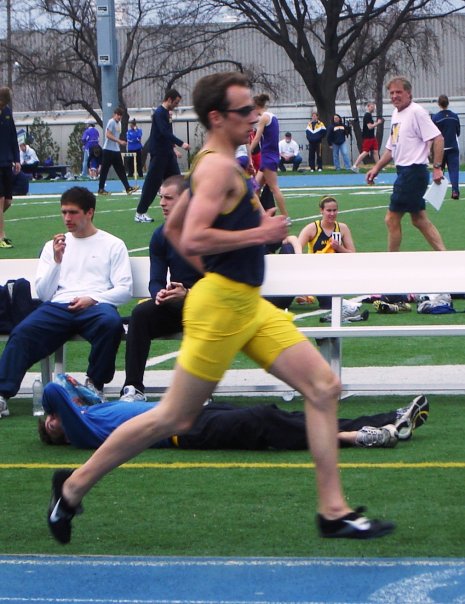
I think, I was 157 at the time, not much muscle, but you can see my abs and stuff like that. So, I thought that that was healthy, and this is what I needed to do in order to be successful runner.
It was during this time that I began reading and researching a bit more on nutrition, and I somehow came across the low carb diet. I switched from paleo to low carb because I thought, “Oh, dang, this is definitely better.” Not a wise move if you are going to be doing distance running because what ended up happening is instead of being relatively shredded for a distance runner, I ended up getting really bloated, had more gut issues and ran significantly worse compared to my sophomore year, which was my pinnacle.
But the rigidity took its toll, and I started to struggle with binge eating.
Though I stayed within the confines of the diet, I would eat an entire bag of almonds, or an entire jar of peanut butter, or entire bag of grapes, just because I felt like I needed something to offset that restrictiveness, and then I would inevitably beat myself up over imbibing in that food, even though the food was healthy. That spiraled to negative self-talk and being really hard on myself.
Once I finished my running career, I decided I wanted to get big and muscular. So, I still kind of kept within the low carb diet, but I just ate a lot more.
During this time, I started yo-yo dieting. Bulking and cutting. I would get up to 207, and then down to 165. I did that probably two or three times during PT school, and the cuts would inevitably end with me binging on a variety of foods, and that is why I gained a lot more weight.
A lot changed in 2017, and that is the year that I had gotten fired from the NBA.
I am one of those people that if something bad happens, I am going to just completely flip the switch and use that negative energy to something positive. So I resumed blogging and went HAM on trying to get shredded. I never really had a six pack, so I thought now was the time.
I followed a diet plan that inlcuded a lot of food groups, and I had went from 190 to about 170. Pretty dang good.
But in my eyes, it wasn’t enough.
I still couldn’t see my abs, and didn’t fit the standard of how I should look, which in the fitness industry is tough. You look at other people in the industry and you are like crap, I look nothing like that. What am I doing in here? You almost feel like a fraud in a way.
So, I really tried to lean out even further, and so that is when I started messing with intermittent fasting, and just basically not eating that much. I do not know how low my calorie amounts were, but I ate only twice a day. I just cut down, kept eating less and less until I got to the lowest I had been since my running days, which was 157 pounds.
Yet even then I was so disappointed in my body because I did not have the six pack, but I think two things were going on during that time. One, I had developed a lot of gut issues because I was not eating, and two I had really bad body dysmorphia.
I’ll never forget this moment.
I was at a seminar of Derek Hansen’s and my mentor Daddy-O Pops Bill Hartman, pulled me aside and told me I need to gain some weight.
Here I am super down on myself because I am like, “Man, I had literally lost like 30 pounds, and still did not have a six pack” from what I could tell, but then I looked at some pictures that my buddy Lance took of me, and from afar I could see my abs.
But it was this picture that I knew things were not good.
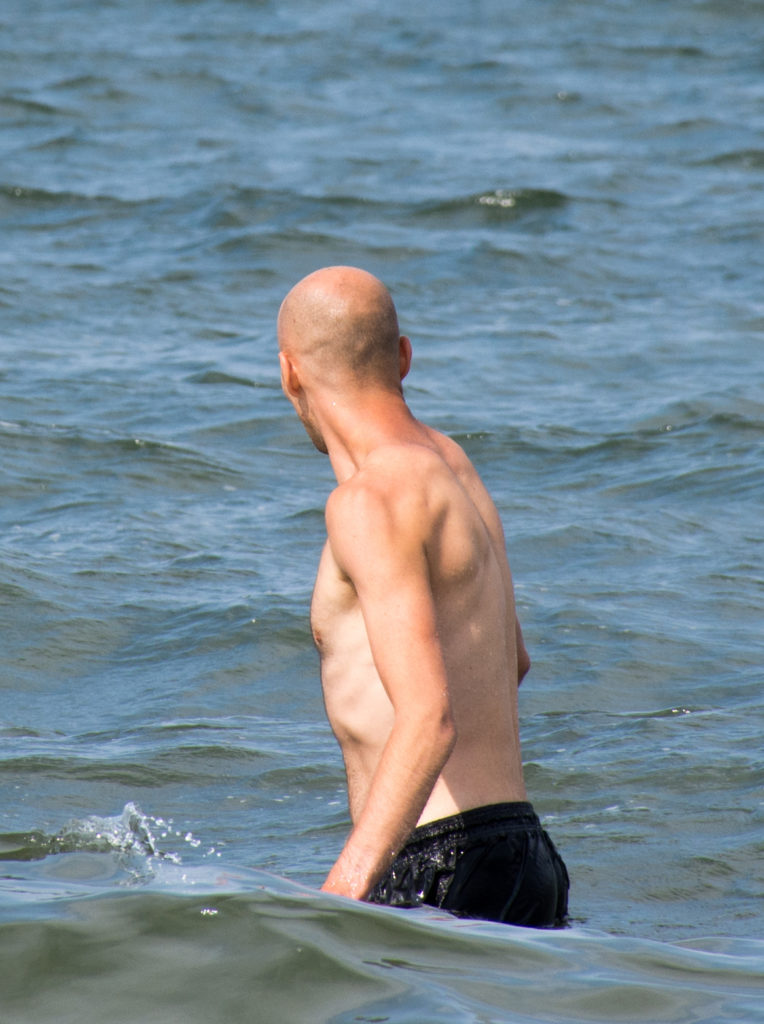
When I saw my shoulders sunken in like that, I knew I needed to turn this ship around.
Unfortunately, I turned it around too much, I started eating a bunch, I would say I got to like in the 170s, 180s, again, but I was definitely leaner than I was post NBA. But then I just really went ham over a period of time and got up to the two hundreds again.

I had cut down again, but this time I did it with some help.
From 2018 to now (not an overnight fix), there were three major things I did that helped me:
- Stay at a healthy, stable weight for me (170ish)
- Make me proud of how I look
- Repair my relationship with food
- Eliminate the negative self talk
- Eat a variety of foods, including treats and going out to eat with ZERO GUILT
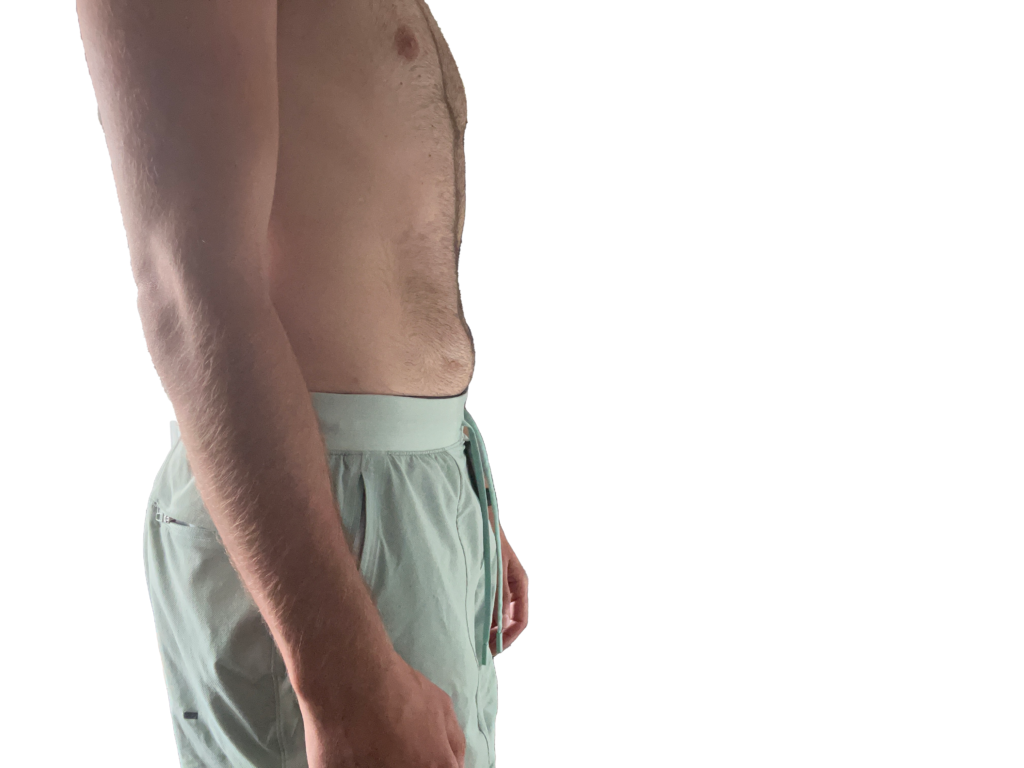
Here’s what I did.
Psychotherapy
The first thing that I did was therapy, I used Talkspace, which is an app you can get on your phone.
I had a couple of different therapists over the course of about two years, and that really helped me indirectly with some of the disordered eating.
I think a lot of the disordered eating habits that I developed were because I had difficulties with external validation.
What I mean by that is, instead of tuning in to my wants, my needs, how I felt about things, I would always ignore that and focus on how I could please other people or help other people, often at the expense of my own health and wellness. The stress from my needs not getting met would cause me to bloat.
Doing therapy really helped me shift to a more internally validated mindset, sticking up for myself, putting myself first, and saying no–things I struggled with for YEARS.
Moving to Vegas also helped me shift my mindset. It gave me a fresh start and I change to become the person I wanted to become. I had a job I liked, my business was going well, and I felt good about life. Many of my gut symptoms I was dealing with disappeared at that time.
So, even though I was not really going to therapy for some of the food issues that I had, shifting the mindset the way I did helped a bunch, and I think that is essential for almost any long-standing condition or issue that you may have.
If you do not have the mindset that is ready to make significant changes within your life–whether it is pushing excellence in entrepreneurship, getting through persistent pain, dealing with disordered eating, anything–the chances of you succeeding is going to be significantly reduced, and that is why I am a big advocate for therapy. In fact, it is probably one of the top referral sources that I have for my supreme clientele.
Functional medicine
The second thing I did was work with a functional medicine provider to help with some of the gut symptoms. So, I enlisted my buddy Ben House to help me out because I was just bloated as all hell, and I just wanted to see if there was anything going on with my gut.
Because Ben is a meathead, he helped me eat a lot more and expand the number of foods I ate without getting fat. He also ran blood panels on me, but everything looked good. Most of my symptoms were stress-related.
I became a believer when he put me on the low FODMAP diet, and in 2 weeks I lost 2 inches off of my waist WHILE EATING MORE!
Losing that bloat was eye opening for me. It made me realize that I wasn’t necessarily fat all of my life, but was really bloated. That gave me a huge mindset shift in how I looked to myself, and provided me a locus of control.
Intuitive eating
My buddy Dave put me in touch with a nutrition coach who needed my help, and we were going to trade.
I was a bit skeptical in the beginning, but I have to give so much credit to the last two years to Georgie Fear, my nutrition coach, for really helping repair my relationship with food.
Georgie really opened up my food menu in ways I never thought I could through intuitive eating, focusing more on food habits to follow.
What I really liked about Georgie is she is kind of like “well, Zac, you can eat treats if you want, as long as you are hitting all of these habits consistently.” TREATS? You serious??
I was free.
Having that freedom to eat whatever I want while keeping habits in place to maximize my health had changed the game.
Following this strategy, I hover around 168 to 172, with eating out every other week or so, having treats from time to time, minimal bloating, and zero guilt in the process.
The most important habit I discovered was paying attention to my hunger and satiety cues, something I never really did.
If you think about it, if someone struggles with tuning into their needs and feelings like I did, it would make sense that I would have a difficult time sensing when I’m hungry and full. They are one in the same. It really was just an extension of the skills I had acquired in therapy.
Am I really cured?
Does that mean that I have absolutely zero issues? Everything is going hunky dory?
For the most part, yes. But it is just like anything else, folks. I have flare ups from time to time. There is times where I look at myself in the mirror and I am like, “Uh, homie you ain’t looking good right now,” or I might get stressed about gaining a couple of pounds, but the incidence is significantly less. Instead of a daily to weekly occurrence, this is maybe once every couple of months now.
It is no different than someone who might have had a persistent pain issue. You might still have flare ups from time to time, and that is okay. But now I have the skill set to recognize that even if I am feeling these feelings, I know they are only temporary, and unlikely a reflection of reality.
Most importantly, I have control over my relationship with food, and if things are not trending in the direction that I need them to, I refocus on my habits and skills I learned in therapy.
And that is basically how I was able to overcome some of the disordered eating issues that I had.
If you found this useful, please share it with someone near and dear to you, especially if you know someone who is struggling with disordered eating. It is a bit of an issue that is near and dear to my heart. As not only have I struggled with it, but I have had a family member who has close to me who has also struggled with it as well. So, the more awareness that we can build of how common this is, and the greater dialogue that we can have surrounding this, the more people we can help.
